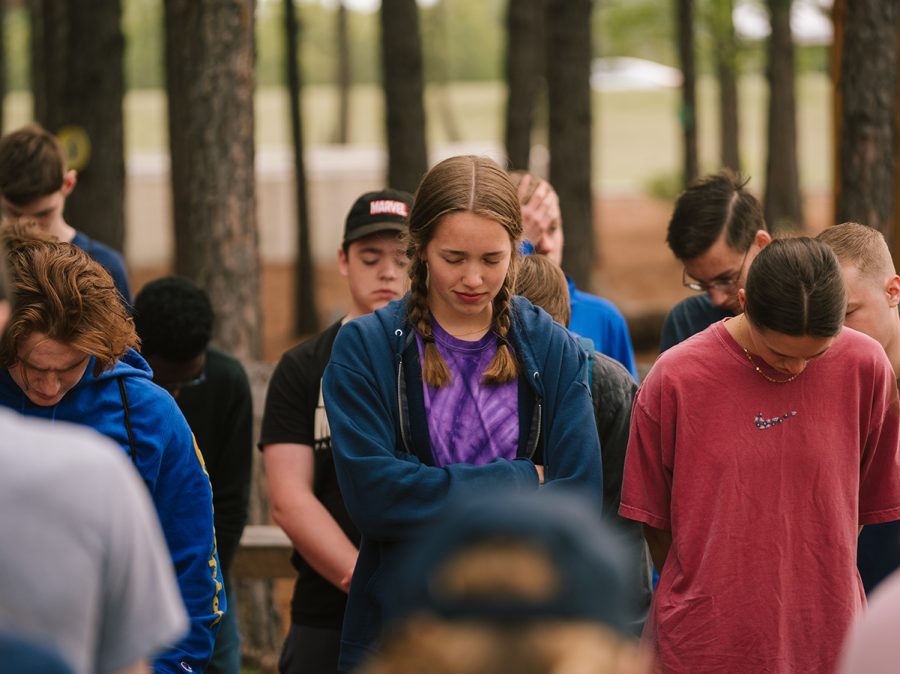Classical Conversations® Challenge IV is the final level in the Challenge program, the culmination of the Classical Conversations experience. Whether your student has completed Foundations, Essentials, and the previous levels of Challenge or is entering Challenge IV as a first-time Classical Conversations student, this post is a great place to start discovering the skills and subjects your student will learn in this program.
An Overview of Classical Conversations Challenge IV
This overview of Challenge IV will cover the program’s respective student ages and grade level, theme, strands, and reading list.
Challenge IV Student Ages and Grade Levels
Homeschool families with students ages 17 and up can enroll in Challenge IV. In other words, this program is comparable to senior year in high school, or 12th grade.
The Challenge IV Theme
The theme of Challenge IV is understanding consequences defines leadership. In other words, throughout this year, students are encouraged to recognize that understanding the consequences of decisions is part of the decision-making process. Indeed, it’s an ability that sets good leaders apart.
Naturally, students examine historical and literary figures’ mistakes and successes to better understand this theme. In addition, students consider what it means to be a good leader by discussing duty, honor, and leadership with their peers. Also, students lead seminars themselves, which presents an excellent opportunity to learn to ask good questions, engage an audience, and guide conversations toward the pursuit of truth and virtue.
The Challenge IV Strands
As with the other levels of Challenge, Challenge IV incorporates learning six strands (i.e., “skills”) through studying subjects both at home and in community with peers and a Licensed Director. The Challenge strands are logic, grammar, research, exposition, debate, and reasoning.
Logic
In the logic strand, Challenge IV students study pre-calculus or calculus, subjects that require students to apply basic arithmetic and algebraic skills developed in previous years. Students build on these skills to solve real-world problems involving chemistry calculations, rates of decay, and statistics. Ideally, students will come to cultivate habits of patience and perseverance, make connections between math and other subjects, and notice beauty in math by the end of their final Classical Conversations logic strand.
Grammar
Students conclude their Classical Conversations Latin studies in the Challenge IV grammar strand by working through Henle: Fourth Year Latin. Here, students move from literal to ideas-to-ideas translations that allow the innate beauty of the original work to shine through to the English translation. Students translate excerpts from Virgil’s The Aeneid — a work they read in the exposition strand — and other original source documents.
There are many reasons to study Latin over the long term. And many students find that it is in Challenge IV where they reap these rewards, like understanding the English language more fully and developing assertive mental discipline.
Research
In the Challenge IV research strand, students learn physics. They apply reasoning and math skills to understand the concrete world through abstract ideas like work, energy, and motion. In community, students solve problems together and rely on their knowledge of science, math, philosophy, and history to discuss age-old ideas about reality, including the secular idea that faith and reason should be separate. At home, students complete lessons from Calculus for Everyone, make connections between science and math, and keep a notebook to record additional research.
Exposition
In their last exposition strand, Challenge IV students read and discuss The Iliad, The Odyssey, The Aeneid, and other ancient works. In community, students consider the virtues and vices of the characters in these stories that are vital to understanding our cultural heritage in the Western world. Students also practice memory and delivery (two of the Five Canons of Rhetoric) by memorizing and presenting dramatic interpretations of ancient literature selections.
Debate
In the Challenge IV debate strand, students study world history. This prepares them to graduate high school with an appreciation for many cultures, places, and peoples across time and continents. In turn, this encourages students to become more considerate of diverse opinions and perspectives, more prone to question the role of bias, and quicker to listen and slower to speak. Reflecting this year’s theme, students also observe the consequences of the decisions that historical figures made throughout world history to understand what qualities define good leaders. In addition, students give six oral presentations throughout the year where they can hone their rhetoric and debate skills.
Reasoning
In the reasoning strand, Challenge IV students read and discuss the Old Testament. After all, Christian leaders ought to know and understand God’s Word! At home, students keep a notebook of theological terms and ideas, notes, and outlines of the reading material. In community, the students consider and discuss big questions about humanity, God, good, and evil. By contemplating the Bible’s narrative, students will see how the law and prophets point to Christ as the fulfillment and embodiment of Scripture, understand the kingdom of God more fully, and ultimately draw closer to God and the Truth.
The Challenge IV Book List
The Challenge IV reading list includes resources to help students discover that understanding the consequences of actions is a defining quality of good leadership. To view the Challenge IV book list, visit our bookstore.
How to Enroll Your Student in Challenge IV
In the Foundations and Essentials years, parents sow the seeds of their children’s education by teaching them basic grammar and foundational concepts. Then, in the upper years of Challenge and particularly in Challenge IV, parents and students reap the rewards of their hard work and perseverance as students begin to demonstrate clear communication, quick decision-making, and critical-thinking skills, in addition to having a broad knowledge of a variety of subjects.
In sum, Challenge IV concludes the Classical Conversations journey, preparing students for success in all areas of life.
To learn more about or to enroll your student in the Classical Conversations Challenge IV program, click here.



